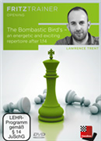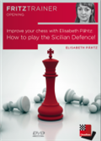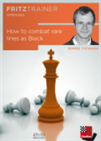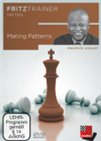Plenty of decisive results
Only 11 of the 45 games played this year at Café Batavia finished peacefully, with no participant signing more than three draws throughout the nine rounds. This might have something to do with the friendly environment that we can attest from photographs and players' testimonies. Under these circumstances, investing oneself in showing creative ideas might trump the desire to get a good sporting result.
In the midst of such combativeness, two players were close to end the tournament unscathed. Dimitri Reinderman lost just once, accumulating seven wins and one draw to finish on a stellar 7½ out of 9 score, while Tomasz Warakomski also lost a single game (to Reinderman) but did not collect so many victories, reaching a 6½ score that left him in sole second place.
One of the main motivations to participate in this event is the chance to get a grandmaster norm. This year, 6½ points were needed to reach that goal, but none of the six IMs in the field achieved that score — Reinderman and Warakomski are both grandmasters. The one closest to the target tally was German IM Aljoscha Feuerstack, who got 5½ points. In terms of rating gain, on the other hand, the most successful was Lawrence Trent, who arrived in the Dutch capital as the lowest-rated participant and collected 4½ points.
 Welcome to the Bombastic Bird's, a revolutionary repertoire for one of the most enterprising and underrated openings in chess theory (1.f4). In this series, IM Lawrence Trent uncovers a number of groundbreaking theoretical novelties and new ideas that will soon have scorners of this romantic system regretting they ever doubted its soundness.
Welcome to the Bombastic Bird's, a revolutionary repertoire for one of the most enterprising and underrated openings in chess theory (1.f4). In this series, IM Lawrence Trent uncovers a number of groundbreaking theoretical novelties and new ideas that will soon have scorners of this romantic system regretting they ever doubted its soundness.
Lawrence Trent | Photo: Lennart Ootes
Since we last reported after round five, Reinderman won three more games and lost against Friso Nijboer, who otherwise had a forgettable event. In round six, Reinderman faced Edwin van Haastert, who would later withdraw from the tournament as he had been ill all week. Out of a Sicilian, Reinderman, playing Black, left his king in the centre and ended up infiltrating White's kingside:
 The continuous stream of new ideas in the Sicilian makes 1..c5 the most popular answer to 1.e4. On this DVD I do give an introduction to the most important Sicilian systems.
The continuous stream of new ideas in the Sicilian makes 1..c5 the most popular answer to 1.e4. On this DVD I do give an introduction to the most important Sicilian systems.
Black did not mind giving up the f-pawn and played 20...h4. There followed 31.♗xf5 hxg3 32.hxg3 ♜h5 33.♗e4 f5 34.♗g2 ♚d7, and the plan is clear — to bring the other rook to the attack on the kingside.
Van Haastert made a couple of mistakes in the next moves, and had to resign when his bishop found itself cornered on g2-h1.

Dimitri Reinderman receiving his prize from organizer Merijn van Delft | Photo: Lennart Ootes
During the same sixth round, Warakomski used an unusual approach with the black pieces against Nico Zwirs:
 A complete repertoire for Black is set out to be used against moves such as 1.Nf3, 1.f4, 1.g3, 1.Nc3, 1.b3, 1.b4 and 1.g4. The author uses content from his own notebooks to provide a full explanation of how to proceed.
A complete repertoire for Black is set out to be used against moves such as 1.Nf3, 1.f4, 1.g3, 1.Nc3, 1.b3, 1.b4 and 1.g4. The author uses content from his own notebooks to provide a full explanation of how to proceed.
Zwirs gained the space advantage his opponent almost invited him to get with 6.d5, and after 6...♞a7 7.♗d4 ♚f8 8.♗xg7+ ♚xg7 White was clearly on the driver's seat. Zwirs handled the initiative correctly, until he faltered on move 21, when he could have left Black's kingside a completely uncoordinated clutter:
White considered his best alternative was to open up the h-file with 21.hxg6, when 21.h6, further constraining Black's mobility was the way to go. Soon, it turned out that it was White's king the vulnerable one on the board. Warakomski ended up scoring a crucial 42-move victory after having survived a vastly inferior position.

Polish GM Tomasz Warakomski | Photo: Lennart Ootes
In round eight, third-placed Feuerstack took advantage of Nijboer's slightly careless opening play to quickly get an attack against the white king:
 Starting with Black's alternatives on move 3 and working through until the main lines of the Closed Lopez and the Marshall and Anti-Marshall, the viewer will find his knowledge of the opening developing in tandem with an improvement in his tactical ability.
Starting with Black's alternatives on move 3 and working through until the main lines of the Closed Lopez and the Marshall and Anti-Marshall, the viewer will find his knowledge of the opening developing in tandem with an improvement in his tactical ability.
The German IM went for 14...♞xf3 after thinking for a little over nine minutes. Nijboer found the correct 15.♘g3, and the game continued 15...♛xh2 16.♔xf3 ♞xg3 17.♗f4. Black was committed to the attack and saw it necessary to play 17...f5.
As it usually happens in these situations, the side with the attack ended up using his initiative to get a favourable endgame. When White resigned on move 43, it was impossible for him to stop his opponent's strong passer on the c-file.

Aljoscha Feuerstack | Photo: Lennart Ootes
It must be noted that during the second half of the tournament, Indonesian IM Irine Kharisma Sukandar was the top scorer, as she got 3½ points from rounds six to nine. Sukandar did get a "free" full point on the penultimate day of action, as she was paired up against Van Haastert, but she also defeated Feuerstack and Miguoel Admiraal.
In fact, it could have been a perfect 4/4 finish for Sukandar, had she found a killer blow against Warakomski in the last round:
 On this DVD, Grandmaster and worldrenowned commentator Maurice Ashley reviews some of the most interesting patterns with examples meant to educate and entertain.
On this DVD, Grandmaster and worldrenowned commentator Maurice Ashley reviews some of the most interesting patterns with examples meant to educate and entertain.
34...♞xd2 is completely winning here. Sukandar played 34...♜be8 instead, giving White a chance to go 35.♗c3 with enough counterplay to get a draw. Nonetheless, after the knight capture, Sukandar needed to see that in the line 35.♕xd2 ♛h1+ 36.♔d2 Black wins by giving up a rook with 36...♜xf2+. Try your own lines on the diagram above to confirm that there is no way for the white king to escape.

Irine Sukandar had a great second half at Café Batavia | Photo: Lennart Ootes
Final standings
All games
Links
























